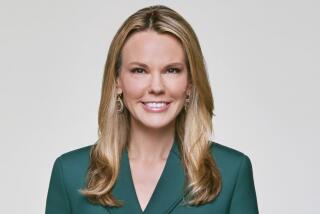Mitchell Vows to Pursue PBS’ Mission
- Share via
NEW YORK — CNN Productions President Pat Mitchell, introduced Monday as the new president and chief executive of the Public Broadcasting Service, stressed what she sees as public television’s unique purpose--education and public service--as setting it apart from its commercial television rivals, which are increasingly stepping onto PBS turf.
In a Washington, D.C., press conference, Mitchell, 57, jumped delicately into the debate within public television over the acceptable limits of commercialization, noting that PBS isn’t making programs “to reach the biggest number of eyeballs” in order to please advertisers, and said she wants to make sure it remains clear to viewers that “what we stand for is something singular in this consolidated and commercialized world.”
Still, with public television often strapped for the necessary funds to produce the kinds of shows it would like, commercialization is likely to be a recurring theme as Mitchell grapples with everything from attracting top producers to the much-criticized “pledge” programming. The music specials and self-improvement pitch people who dominate the on-air fund-raisers often attract a new audience to PBS stations, but also alienate some loyal viewers.
Mitchell said she plans to talk to station executives about why they like the programs, noting that “they are taking into consideration what is most effective for them and their communities. . . . I’ve got a whole lot of listening to do here.”
Indeed, Mitchell, who officially starts March 6, said in an interview that she will undertake a tour of the stations to listen to their thoughts on what works well and what doesn’t. Under Mitchell’s predecessor, Ervin Duggan, who resigned Oct. 31, relations between PBS and its 175 local stations, which fiercely guard their independence, were increasingly strained, and one of Mitchell’s biggest challenges will be to forge consensus with stations.
*
Mitchell called the PBS stations, with their strong ties to local communities, an important advantage in a rapidly consolidating media world.
PBS Board Chairman Colin Campbell said Mitchell was chosen because she is an “extraordinarily creative person, with obvious management skills . . . real media expertise, major diplomatic skills and consensus skills, and a deep commitment to public service.”
Robert T. Coonrod, president of the Corp. for Public Broadcasting, which administers federal funding for public television, said the fact that Mitchell was the unanimous choice of the PBS search committee “says something about her ability to bridge differences.” The president of PBS, he noted, needs to be “a brilliant media executive and a good politician and a skilled diplomat.”
Coonrod said PBS has two major challenges. While the prime-time schedule “is as good as it’s ever been,” he said it nonetheless “needs to establish a kind of character with the American people and the press, so that quality can break through the clutter.” And he said there is a whole dimension to PBS, from an Adult Learning Service to book giveaways and child caregiver seminars, “that simply isn’t getting the attention it needs and deserves.”
Mitchell said she wants to move as quickly as possible to name a new chief programmer, a post that has been vacant since May, and said a priority is to “make sure the creative community thinks of us first” as the place to do “their very best work, their most impactful work.” She singled out the PBS documentary show “P.O.V.” as “one of my absolute favorite series. It picks up the kind of independent work that doesn’t get picked up anywhere else.”
More to Read
The biggest entertainment stories
Get our big stories about Hollywood, film, television, music, arts, culture and more right in your inbox as soon as they publish.
You may occasionally receive promotional content from the Los Angeles Times.










